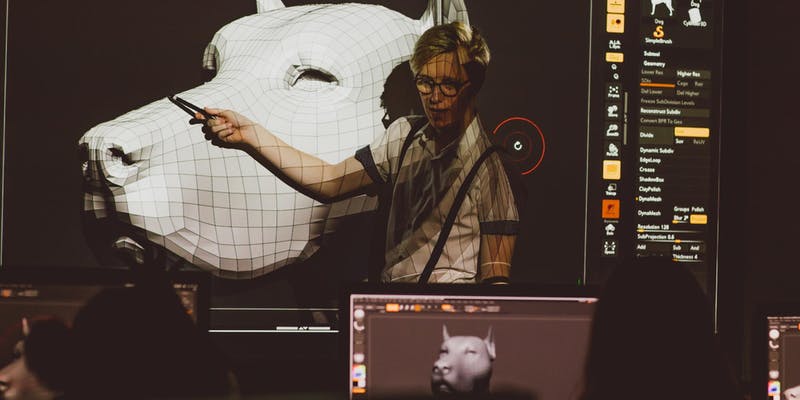
The animation industry is one of the fastest growing sectors in the UK. In the last 15 years there has been a 500% growth in the animation sector, and there continues to be an increasing demand for skills. However although over 600 students graduate in animation each year in the UK, these universities can’t deliver enough talent at the right level, so at least 30% of the animation talent comes from abroad, and in many studios 60% of talent is non UK. So heading into Brexit there is palpable concern about how this workforce will be affected and how the industry will react, especially as the European animation schools offer better training with an almost 100% employment rate from the best.
Early February 2019 Film London and Escape Studios in association with Universities UK hosted ‘Mend the Gap’ to discuss this gap between higher education and industry needs. Bringing academia and industry together to look at how universities and the animation industry can work together to solve the growing skills shortage in the UK.
Chaired by Adrian Wootton OBE – Chief Executive of Film London and the British Film Commission. The panellists were: Natalie Busuttil, Studio Manager at Nexus Studio; Gareth Ellis-Unwin, Head of Film for ScreenSkills; Dr. Eddie McCaffrey, Senior Lecturer on BA Film (Production) at Middlesex University; Kate O’Connor, Executive Chair at Animation UK; Shelley Page, Independent Talent Executive; Greg Wade, Policy Manager at Universities UK; Alexander Williams, Head of Animation at Escape Studios. The event was produced by Julian Scott, animation consultant at Film London.

Q: An animation degree could cost 40k, is that a good investment?
Kate suggested that it depends on what you want, although recruitment is primarily from graduates, a degree is not a passport into work, but it could also open up other options, jobs in other fields for example. However there are other options, there are some apprenticeships starting in VFX now, and other ways into the industry. Gareth agrees that there are other forms of education and working can give you better and directly relevant training. You have to weigh up the cost of the degree and the three years of lost wages too. Alexander reminds us that UK graduates are not being shaped up for the animation industry, and the UK needs to do better at training students for the skills that are needed when they graduate, as the top European Schools are doing. Because of this Escape offers top up courses that fill the gap between what students are taught and what the industry needs.
“As a leading force in the global animation/VFX industry we need to do more to nurture home-grown talent. It’s time to take inspiration from the European schools and think about how we can help UK students and institutions to raise their game.” Natalie Busuttil, Studio Manager at Nexus Studio
As Shelly argues, do your research. What are the alumni doing? Do the graduates go on to do what you want to do? And an important concern not to be overlooked is the number of hours you have face to face with a tutor? Natalie explains that a degree offers you the opportunity to immerse yourself in a breadth of different opportunities and experiences, to network, to try new things and give you a more rounded experience before committing yourself to one pathway. Greg reminds us that the older generation hasn’t had to make this choice, as degrees were free back then, however as 90% of the job growth is for graduates it can pay off even if you change career direction.
It’s not a waste but it depends on you. A degree is right for some, but not everyone. It is not a passport to work and you may still not be ready for the animation industry, but it will give you vital transferable skills, and you are in a better position to get a job if you change the course of your career.

Q: Are students studying for non-existent jobs?
Higher Education is not a machine for “delivering workers for jobs” Kate explains. It is an opportunity for people to develop their critical thinking skills, research and analytical abilities, the ability to develop and communicate an argument.
But how do we put a framework in place for students to know what they will be getting from a degree asks Natalie. Degrees offer different opportunities to students, some might be more practical and aimed at industry entrance, others more academic. Gareth describes the SkillSet accreditation tick on animation courses that offer courses considered good for the industry. This used to be done in the field, visiting universities and checking the kind of things they were learning, and how it transferred to industry skills requirements. Now the universities make a presentation to them to show that they are keen on training students for industry needs.
“We know there are higher education courses of mixed value to any young person whose goal is actually to work in the screen industries, especially a booming sector such as animation. That is why we have our quality mark for those courses judged industry-relevant, which we are constantly working on improving in importance and relevance. But we also need employers to take a more active role in supporting accreditation and work place opportunity, if we are really going to get the skilled workers everyone needs.” Gareth Ellis-Unwin, Head of Film for ScreenSkills
But not all students want to go into the animation industry, they are doing a degree in what interests them to get a degree, they may decide to enter a different career after graduating. Eddie reminds us that degrees are offered by universities in response to market requirements. If enough students want to study animation as their degree, then more courses will be run. It’s not always a reflection of how many people want to work in the animation industry. Many students will study what they are interested in in order to get their degree, they then move into unrelated jobs.

Q: What do animation studios in the UK want from graduates?
Everyone in the industry agreed that they need high level skills from graduates. Natalie pointed out that drawing skills need to be solid and software skills need to be very high. At the moment there is a barrier to industry growth here, we skills now Kate warns, otherwise the industry will start to move abroad.
Shelly highlighted the importance of being a team player, as it is an essential part of working in a production pipeline. However universities find it hard to asses student achievement in team assignments, so they tend to do more individual ones, to the detriment of team work skills. Working in a team is often very challenging for students, as it highlights the need for communication and people skills. Alexander was quick to point out that Escape Studios does a lot of team projects, and that was the one aspect of their course that they found hardest during the validation process, which pushed towards individual works as its easier to assess, but they fought to keep the number of group projects because it is an essential industry skill.
“Graduates from the top international schools succeed in the global animation industry thanks to excellent training in a full range of animation techniques, working on group projects which can achieve the highest quality of storytelling and film making techniques, and learning about entrepreneurship and how to promote their work to producers, investors and distributors. Do the UK schools really provide equivalent educational opportunities to enable our graduates to fully compete in the jobs marketplace?” Shelley Page, Independent Talent Executive

Q: Is the gap between the skills needed and training offered widening?
Universities may well have to do something to mend the gap between what students learn and the skills needed by the industry, but Chris Williams from Bournemouth University points out that the problem may lie in the way that the UK institutions are funded. The use of league tables means that universities can’t hire academics without PHDs. Rather than being taught by experienced industry professionals, students are taught by academics that may well have a PHD in an entirely different subject, for example live action film history rather than an area of animation.
“More than ever, academia has a vital role in helping to address the industry skills gap. But it requires cooperation, partnership and innovative thinking between, and on, all sides.” Dr. Eddie McCaffrey, Senior Lecturer on BA Film (Production) at Middlesex University
The industry may well want graduates trained to a high level but how are the students entering university? Half out Further Education colleges now don’t offer the necessary creative subjects so when students arrive at University they have to start from scratch, they have lost two years of creative development. Added to that now, children in primary school are doing far less art and drawing overall, and in year 6 almost none at all in some schools. So they are starting out with a huge handicap. How can they reach industry standard in just three years?
The other problem is that many students only want to study for the glamorous jobs. Gareth points out that there are many job opportunities in video assist and roto-art for example, but students either don’t know about these or aren’t interested because they don’t understand that it is a good option to start at the bottom and work your way up, they want to follow their dreams and be ambitious. In fact they almost always have to start at the bottom and work up, and this has to be clarified at University.

Q: Is there too much theory at University?
Alexander is clear that it takes three years to train an animator. But when the practical work is crowded out by the written work, when you are doing too much theory there is not enough time left for learning the craft. Eddie agrees that there is a lot of pressure around academic standards in university. Although it is good to develop evaluation skills, critical review and making an argument, an alternative could be a degree apprenticeship. Media degrees are not all about written theory either, many universities are creating more and more opportunities to combine theory into practice and offer opportunities to stand and pitch your research instead of always present written work.
“The problem with university education in the UK is that the teaching tends to focus largely on thinking and writing, and not enough on doing. Animation is a craft skill.” Alexander Williams, Head of Animation at Escape Studios
Kate suggests a two year accelerator course focussing on professional needs, also proposing the degree apprenticeship. But Shelly strongly disagrees. The strength of the European schools is that they have 4 to 5 year programs, not accelerator programs. Animation is a craft skill and students need to spend the time learning and perfecting that craft.
What remains is that there is a huge volume of animation courses, there is a growing workforce but we need the right skills to support it. Real work initiatives giving students work experience will help.

Q: Work placements are the key to success, are there enough?
There are not enough work placements on offer, and although 40% of the key players are offering some work placement scheme, 20% want to but can’t afford to offer them. SMEs want to get involved with education but they have limited resources, it’s not practical for them to take on these tasks, so Kate explains that there needs to be industry led intermediate bodies to bridge the gap.
“This event couldn’t be more pertinent or timely. With skills gaps and shortages on the increase and 30% of our workforce from the EU, there is real concern about immigration and visa costs. We urgently have to mend the skills gap and address the gap between industry and higher education.” Kate O’Connor, Executive Chair at Animation UK
There is often a high cost involved in making placements work. Shelly’s job was to find the best talent to give work placements to at DreamWorks. High level people there would put all their time into training them, so they had to have enough potential to make that cost pay off. To make that work in the UK the students need to be of a high calibre.
But there are other factors at work here. Work placements are often not paid and set in London where accommodation costs are extortionate. This prevents many talented and capable students from being able to do these placements. Natalie was able to overcome this once by having a ‘Pop Up Nexus’ in Bournemouth to help students there get an inroad into work. But this isn’t something she has been able to replicate again, as there is a cost to the studio. Gareth insists that SkillSet would like to help this kind of scheme, as well as provide software licences, and help with cost of travel to help internships.
The top European schools have 9 month paid work placements, so it would be nice if there was some work placement built into UK schools at least. Eddie agrees that students can’t afford unpaid internships, and companies only want vetted students, between these criteria there are not a lot of students to choose from. Everyone needs to work together to fix this, and to find the unique solutions.
Skillset has been looking at models in other industries. Those industries have responded by offering low paid 2 year training schemes and graduate programs. There is also the possibility of degree apprenticeships. Even the NHS has one of these for people to study illustration and animation.
The benefit of vocational education is that because it includes apprenticeships and work experience, people leave their degree with a CV. There is a need for professional degrees. However universities don’t like these vocational or skills based degrees, because there is an educational snobbery favouring the academic, it is perceived by the industry that they don’t like the ‘whiff of trade’!

Q: What needs to improve in UK Universities?
Since a large proportion of industry professionals are freelance, graduates need a level of maturity, with business and survival skills to manage themselves and their career in a competitive environment. Professionalism and critical thinking skills are important too. Professional practice needs to be a key factor in university education.
A studio manager such as Natalie wants to see industry professionals teaching, not prioritizing people with teaching qualifications and PHDs. But Greg explains that no education system can deliver everything that is requested by an industry. University educates people for all the careers they have not just the first career path. Universities do want stronger links, but at the same time what one industry means by ‘better’ is not what another considers ‘better’. Sometimes universities are put in a position that they just can’t win. Eddie agrees that the industry has very high expectations of what university should be able to deliver, and it is often not practical or possible.
“Surveys show satisfaction with graduate skills are high across all sectors yet many employers still express concerns about skills gaps. Sometimes it is unclear what these skills gaps are, the only way to solve this challenge is to bring employers and universities together as partners in developing talent, not just meeting immediate skills needs but building the skills for future success.” Greg Wade, Policy Manager at Universities UK

Q: What are the obstacles and how do we overcome them?
Stop the turf wars and talk, calls Eddie. In December he has already started the process of getting universities and industry around the table to drop the arguments and work together. Even though they are competitors, they are willing to do this, there is an urgency to this now.
Escape studios are already part of the solution, their aim is to compete directly with the best European schools.
Animation UK is setting up discussions between universities and industry to make direct partnerships.
Greg explains that in universities it’s a leadership issue. Vice Chancellors need to take the lead and say this is really important.
Studios need to talk to the universities. Animation is a craft above all else and the craft needs to be taught more effectively.
European schools are great at collaborating. They want to connect and exchange with UK schools.
We need to talk brass tacks.
We need to take action now.

What’s the verdict?
Universities offer a range of opportunities to students, to develop themselves, their critical thinking, their analytical skills, communication, organisational and craft skills.
Graduates have greater opportunities in the wider employment market, and many students study animation because it’s an interesting way to get their degree. It’s not a soft option topic in my opinion, which they discover soon enough. But it’s good to do a degree in a subject that you enjoy.
But – students may not graduate with enough craft skills at a high enough level to go into many sections of the animation industry which requires a very high level of skill.
For that they may need to go on and do a professional skills development course, such as those offered by Escape Studios, or an internship if they can find one. Maybe some professional degrees, and more vocational courses, will be developed too since there is clearly a gap in the market there.
If industry sectors want universities to train students in certain skills they need to approach universities with these requests and universities who promise students that they can progress into those industries need to embrace teaching these skills by experienced industry professionals.

However there are other areas of the animation workforce that were not represented at this panel discussion. The independent sector and the marketing sector.
Many animation graduates may become freelance professionals one day in the huge field of content marketing, and for this they need business and entrepreneurial skills, which are lacking in most universities. They don’t need the same level of skill required by the ‘traditional’ industry sectors of feature and games production. Instead they need to work fast and produce work in set styles.
The independent sector are finding fantastic opportunities to access a vast internet audience to develop, fund, promote and monetise their own animated product. However these business models are rarely touched upon in Universities today. These students need the space to develop their own unique styles, quirky ideas and popular content ideas to stand out as unique in a crowded world.
So we can see that there are at least four different reasons to do a degree in animation:
- To go into the Animation Industry (feature and series production, games, advertising)
- To just get a degree and enjoy doing it
- To go into the freelance marketing sector (motion graphics, educational and training content, informative and entertaining content)
- To produce an independent animation product (YouTube channel, Crowdfunding, animated series for new TV channels, make independent films, become an established animation artist)
All of these are good reasons to do a degree. UK universities are differentiating themselves to some degree as to what kind of path they can offer their students, and they need to do this more.
Some universities, like Bournemouth and Herts, and Escape Studios are known for being the best route into the visual effects industries. Royal College of Art offer the best route into advertising. Other universities who offer a route into the industry need to work closely with that industry to make sure the course stays relevant.
Those whose students go on to do marketing and independent production would do well to embrace that, celebrate it and enhance that by adding business and entrepreneurship to their courses.
I hope you found this post useful and interesting, if you want to add anything please do so in the comments below.
Thank you.
Interesting related article from Saint John Walker’s blog KnewMedia.

This is something I’m struggling with so much as a third year animations Tiffany about to graduate iv applied for over 150 jobs in a desperate need to find a job in animation but keep getting rejection after rejection saying I don’t have enough experience or skill to be qualified for the job.
It doesn’t help that my whole second year was a waist and I payed for one class that whole year was never taught anything that is needed for the industry as a third year now iv been begging my teachers since last year to at least teach me toon boom but still am waiting. Spending over 30k to have an empty year and barely learn anything or gain enough experience to be able to get in to an indestructible I love saddens me and has caused me lots of stress.
Now I don’t know if I should pay more money and actually study abroad or just hope that a random company would actually take me in and let me gain experience and more knowledge through them.
It’s a little runt from a student that feels cheated by the education system especially when I complained I got shit up by the teachers telling me what’s passed has passed not know I have payed 9k per year to gain nothing from it in the end
Hi Judai, I am saddened to hear your experience, thank you for leaving a comment, I think it’s important to include the student voice in a debate like this. It does seem that some universities are set up to offer an academic degree but not yet set up to help students develop skills that are useful for working in a skills based industry. I think many students at the start, when choosing a university, don’t know what to look for in a degree either. That makes it even more important to offer animation foundation courses at FE level so that students are more prepared for finding the best next step for them, be that the right university or the right skills based course. Universities will be marketing their courses so they need to be careful what they promise, and students need to be careful how they choose a course too, but without the right preparation at FE level, students are less likely to be able to make the right choices.
Having said this, there are some excellent UK universities that do train their students to an industry standard, as well as deliver a sound education and academic insight into the subject. It is competitive to get into these, as it should be. There are also some excellent courses that fill the gap between degree and job. I can personally recommend Escape Studios, they do a course on Toon Boom by the way, but also don’t forget that it’s best to get into the industry in an area where there is a shortfall, like storyboarding (they do a course on that too). At the moment it isn’t out of the ordinary to have to do a skills based course after a degree to find a place in the job market. Universities see themselves as educating their students in the broader sense, but the industry wants a high level of skill AND experience! There is a gap in their somewhere, and this article explores the work that is being done to rectify this problem.
Good luck in your journey, and thank you for your comment.
Thanks for bringing this to light Lucy…however I think these kinds of debate always end up making generalisations. There isn’t one kind of University, nor one kind of Animation degree. I don’t have enough Word Count here to articulate everything, but for a start, where were the Animation tutors and those on the ‘shopfloor’ who can give a more insightful commentary in this debate?
Secondly some assumptions need to be questioned- there are structural reasons why alternatives to the degree haven’t succeeded, and why Apprenticeships are impractical for many.
We need new thinking in the HE and Industry. For instance Blended MOOCS do work, but have yet to be designed by a risk averse industry and HE. Also micro-credentialling of University modules by industry is an excellent opportunity. Work experience is not the only way- work simulation, live briefs and role modelling work really well as second choices.
Industry should also know more about the metrics that Universities are beholden to which now lead to perverse incentives. The NSS/TEF/REF/KEF (sorry for the acronyms) could be aligned (but not controlled by) Screen Skills accreditation and revivify quality. Animation is an art and a craft, but so is teaching.
Thank you Saint! This was a widely debated topic where I posted a link on LinkedIn, so thank you for leaving your comment on the post too so a wider range of readers can see it. A fantastic response, and thank you for taking the time to add it here.
I wanted to pick up on something important in the course description for your animation degree at Norwich “…the diverse and ever-evolving animation industry”. My thoughts are that the wider animation industry is indeed diverse and always evolving, and therefore students actually do need a wide and varied range of courses to chose from.
My only request is that students are offered professional practice, ‘creative business‘ and entrepreneurship modules in whatever course they do because many of them are going to be freelance or SMEs. It’s important to ensure that the unique approaches, tools and advice that freelance creatives absolutely do need come from animation freelancers and businesses in the field. Crucially there are so many different entrepreneurial creative practice models to explore now that I believe it would be beneficial for everyone to offer more than lip service. That way we are all adding to a healthy creative economy where more creatives can really thrive.
Thank you once again.